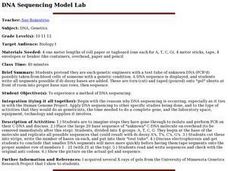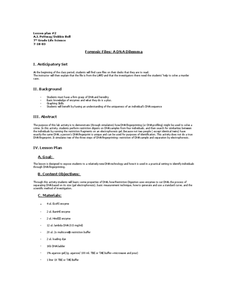Chemistry Collective
Virtual Lab: Determining the pKa and Concentration Ratio of a Protein in Solution
It's pretty common to determine the dissociation constant for an acid or a base ... but, what about a protein? Challenge your class with a virtual lab designed to further develop their acid-base chemistry skills. Individuals determine...
Chemistry Collective
Virtual Lab: Unknown Acid and Base Problem
Looking for an easy way to give your class experience with acid-base chemistry outside the lab? Try a detailed interactive that puts them in total control! Young chemists determine the dissociation constant and concentration of an...
Chemistry Collective
Virtual Lab: Standardization of NaOH with a KHP solution: Acid Base Titration
This is not your standard standardization lab! Take titration into the high-tech age with a simulated workbench. Learners perform titrations to standardize a sodium hydroxide solution using a KHP solution of unknown concentration....
Chemistry Collective
Virtual Lab: Creating a Buffer Solution
Buffers don't just magically appear in the stockroom when you need them! Give learners a crash course in buffer basics using an interactive lab assignment. Individuals are tasked with creating a buffer with a certain pH that will react...
Chemistry Collective
Virtual Lab: DNA Binding Problem
Why do the bases in DNA pair up the way they do? Unravel the mystery of the double helix in a virtual lab. Young scientists follow in the footsteps of Watson and Crick to determine the free energy associated with DNA base pair binding....
Chemistry Collective
Virtual Lab: DNA - Dye Binding: Equilibrium and Buffer Solutions
Your class is bound to be fascinated by this virtual lab! Young biochemists explore molecules that bind to specific sites on the DNA molecule through a skillful simulation. The lesson challenges learners to create a DNA-bound solution...
Chemistry Collective
Virtual Lab: Determination of the pH Scale by the Method of Successive Dilutions
Where did the pH scale come from? Take a deeper look at a most important measure of ion concentration using a simulated physical determination. Young chemists prepare a series of dilutions after determining a dilution factor for the...
Curated OER
Soil Sample Lab
Students test the pH of soil samples they collected from the field trip. For this chemistry lesson, students differentiate acids and bases. They write a lab report about the experiment.
Learning Games Lab
The pH Scale and Meter Calibration
What are the different ways to test for pH? First, scholars explore the pH scale and a common way to test for acidity and alkalinity. Then, they learn about the importance of pH in food safety and why variance in pH could potentially...
Concord Consortium
Protein Folding
Long strings of amino acids fold themselves into stable peptides. The simulation allows scholars to observe the process in multiple ways. Using hydrophobic, hydrophilic, or a combination of proteins in three different solutions, the...
Curated OER
DNA Detectives
In order to understand DNA fingerprinting, advanced biology aces divise a crime scenario and analyze three different samples of lambda DNA. This creative lesson plan provides practice with micropipettes, electrophoresis boxes, and other...
Curated OER
Gel Electrophoresis
Learners conduct a variety of experiments to explore gel electrophoresis. For this biology lesson, explain how this process separate DNA and RNA. They discuss the practical applications of this method.
Curated OER
DNA Sequencing Simulation
Students explore the Sanger sequencing method which produces a nested set of radioactive fragments from a template strand. They simulate the Sanger method of sequencing DNA, both visually and kinesthetically.
Curated OER
Cholera and the Scientific Method
Five individuals in the class are "infected" with cholera! The rest of the class serves as investigators to discover the source of the outbreak. They test drinking fountains around campus for contamination. You, of course, will secretly...
Curated OER
DNA Sequencing Model Lab
Students pretend they are each genetic engineers with a test tube of unknown DNA (PCR'd) possibly taken from blood cells of someone with a genetic condition.
Learning Games Lab
Testing and Adjusting pH
Pupils learn how to control food spoilage by adjusting the food's pH. They see that one of the most dangerous bacteria can grow in food if people don't handle and store food properly. Using knowledge of the bacteria's preferred pH,...
Curated OER
Are You Gellin
Students conduct an investigation of differentiating between different types of DNA. This is done with a simulation activity of being a scientist in charge of selling different sets of DNA for research which requires different...
Curated OER
Forensic Files: A DNA Dilemma
Seventh-graders come in to science class to find a file on their desks detailing a crime to be solved! As a demonstration, you simulate the restriction of DNA samples and separate them by electrophoresis. From the gel, learners can...
Curated OER
The Nature of Chemical Change: Acting Out An Example
Students illustrate the molecular nature of matter and show that chemical change involves alteration of molecules.


















